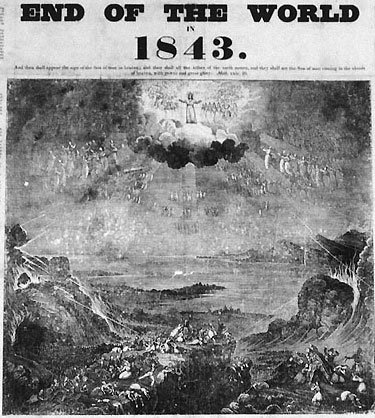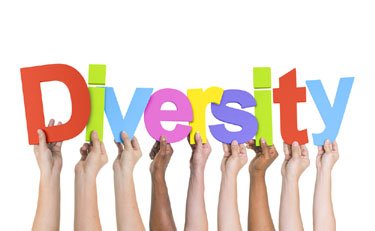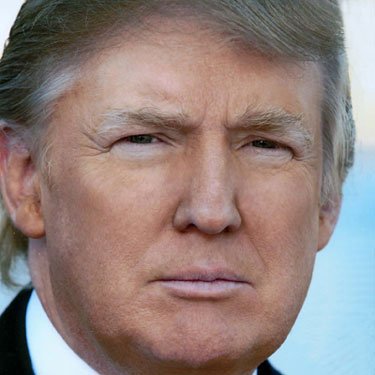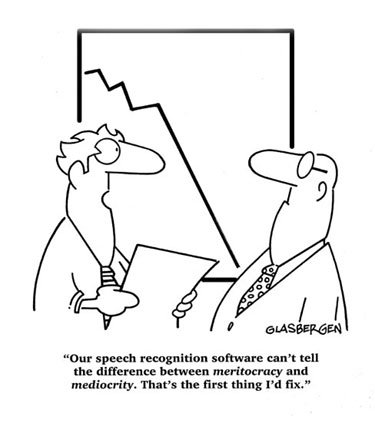Category Archive 'The Elite'
25 Jul 2018


In 1843, well-educated people thought the Millerites were crackpots. In 2020, the consensus of the supposedly well-educated is the equivalent of Millerism.
Roy Scranton is a professor of English at Notre Dame. His discussion of his feelings of guilt over having brought a child into this doomed world appeared in the New York Times.
Anyone who pays much attention to climate change knows the outlook is grim. It’s not unreasonable to say that the challenge we face today is the greatest the human species has ever confronted. And anyone who pays much attention to politics can assume we’re almost certainly going to botch it. To stop emitting waste carbon completely within the next five or 10 years, we would need to radically reorient almost all human economic and social production, a task that’s scarcely imaginable, much less feasible. It would demand centralized control of key economic sectors, enormous state investment in carbon capture and sequestration and global coordination on a scale never before seen, at the very time when the political and economic structures that held the capitalist world order together under American leadership after World War II are breaking apart. The very idea of unified national political action toward a single goal seems farcical, and unified action on a global scale mere whimsy.
And even if world leaders somehow got their act together, significant and dangerous levels of warming are still inevitable, baked into the system from all the carbon dioxide that has already been dumped. There’s a time lag between carbon dioxide increase and subsequent effects, between the wind we sow and the whirlwind we reap. Our lives are lived in that gap. My daughter was born there.
Barring a miracle, the next 20 years are going to see increasingly chaotic systemic transformation in global climate patterns, unpredictable biological adaptation and a wild spectrum of human political and economic responses, including scapegoating and war. After that, things will get worse. The middle and later decades of the 21st century — my daughter’s adult life — promise a global catastrophe whose full implications any reasonable person must turn away from in horror.
RTWT
The irony here is that he may be right: civilization as we know it may be doomed. But the cause of doom is going to be the ineffable stupidity of the morons who took over our establishment institutions, not the junk science theory of Global Warming Catastrophism.
15 Jul 2018


In Hedgehog Review, Matthew B. Crawford explains precisely why “Diversity” is essential to the contemporary meritocratic Haute Bourgeois community of fashion.
[B]ourgeois society is fundamentally competitive. One has to enact one’s social value anew each day. …
The competition inherent in bourgeois society is responsible for its unprecedented ability to create wealth. But there is a problem. Furet writes that “the idea of the universality and equality of man, which [bourgeois society] claims as its foundation and is its primary innovation, is constantly negated by the inequality of property and wealth produced by the competition of its members. Its development belies its principle, and its dynamic undercuts its legitimacy. The bourgeoisie did not invent the division of society into classes, but by cloaking that division in an ideology that renders it illegitimate, they tinged it with suffering.â€
The suffering is not confined to those who find themselves on the bottom. Furet is especially perceptive on the psychological effect of this contradiction on those who rise to the top: a kind of bourgeois self-hatred. He suggests that this sentiment is the secret source of the revolutionary passion (and in milder form, we might add, of liberal guilt).
The ongoing ferment on campus reveals the university as the site where the paradox of bourgeois society is most acute. As gatekeeper to the upper middle class, the elite university has as its primary social function the sorting of the population. (And it seeks rents commensurate with occupying such a choice position.) It detects existing inequalities, exacerbates them, and certifies them. And whatever else it does, it serves as a finishing school where the select learn to recognize one another, forging a class consciousness that has lately hardened into a de facto caste system. But for that very reason, by the logic Furet identifies, it is also the place where the sentiment that every inequality is illegitimate must be performed most strenuously.
In times of broadly shared upward mobility, this contradiction was perhaps less keenly felt. But for reasons that are only now coming to be broadly understood, once the Cold War ended, the economy increasingly took on the shape of a winner-take-all competition. The self-applied, legitimizing balm of campus progressivism became more necessary than ever.
But simply becoming more noisy about equality wouldn’t do the trick. Some conceptual innovation was needed, one that would shift the terms in such a way as to ease the contradiction. Enter “diversity.â€
This concept claims descent from a lineage of shining democratic moments in the struggle for equal rights that we rightly celebrate: John Locke’s A Letter Concerning Toleration, Martin Luther King’s “Letter from Birmingham Jail,†the statesmanship by which Nelson Mandela averted civil war in South Africa. But the family resemblance turns out to be superficial when one grasps the function “diversity†serves as a principle of administration in today’s political economy.
As Michael Lind has written, “Neoliberalism—the hegemonic ideology of the transatlantic elite—pretends that class has disappeared in societies that are purely meritocratic, with the exception of barriers to individual upward mobility that still exist because of racism, misogyny, and homophobia.†Marking out the corresponding classes of persons for special solicitude is thus key to sustaining the democratic legitimacy of our major institutions. Or, rather, the point is to shift the basis of that legitimacy away from democratic considerations toward “moral†ones. These have the advantage that they can be managed through the control of language, which has become a central feature of institutional life.
The concept of diversity first germinated in the corporate world, and was quickly seized upon by academia in the 1990s. It arrived just in the nick of time. The previous two decades had seen the traditional mission of the university undermined, if not abandoned, under pressure from a highly politicized turn in the humanities that made its case in epistemic terms, essentially debunking the very idea of knowledge. The role that the upper-tier university soon discovered for itself, upon the collapse of ideals of liberal learning, was no longer that of training citizens for humane self-government, but rather that of supplying a cadre to staff the corporations, the NGOs, and the foundations. That is, the main function of elite schools is to supply the personnel required to run things in an economy that has become more managerial than entrepreneurial.
The institutional desideratum—the political antipode to hated “privilegeâ€â€”is no longer equality, but diversity. This greatly eases the contradiction Furet identified, shielding the system from democratic pressure. It also protects the self-conception of our meritocrats as agents of historical progress. As was the case with the Soviet nomenklatura, and the leading Jacobins as well, it is precisely our elite that searches out instances of lingering privilege, now understood as obstacles to fulfillment of the moral imperative of diversity. Under this dispensation, the figure of the “straight white male†(abstracted from class distinctions) has been made to do a lot of symbolic work, the heavy lifting of legitimation (in his own hapless way, as sacrificial goat). We eventually reached a point where this was more weight than our electoral system could take, as the election of 2016 revealed. Whether one regards that event as a catastrophe or as a rupture that promises the possibility of glasnost, its immediate effect has been panic in every precinct where the new class accommodations have been functioning smoothly, and a doubling down on the moralizing that previously secured them against popular anger. We’ll see how that goes.
The term shibboleth is interesting. Its definitions include “a peculiarity of pronunciation, behavior, mode of dress, etc., that distinguishes a particular class or set of persons†and “a common saying or belief with little current meaning or truth.†It is a random Hebrew word that acquired its present meaning when it was used by the Gileadites as a test to identify members of an enemy tribe, the Ephraimites, as they attempted to flee across the Jordan River. Ephraimites could not pronounce the sound sh (Judges 12:4–6). I think it is fair to say that one’s ability to pronounce the word diversity with a straight face, indeed with sincerity made scrupulously evident, serves as a shibboleth in this original sense. It answers the question of whether one wants to continue as a member in good standing of those institutions that secure one’s position in the upper middle class.
RTWT
18 Jun 2018


Joseph Pearce responds with understandable frustration to the chief problem of our time: the combination of arrogance with lack of real education.
Recently, sitting in traffic, I saw this .. bumper sticker on the car in front of me… which declared the following: “What you call the Liberal Elite, we call being well-educated.†…
Clearly designed to offend other motorists, it is supremely supercilious and extremely arrogant. We, the average Joe, whoever we may be, are not as “well-educated†as the royal “we†driving the car in front of us. This pompous “we,†who is presumably a she, presumes that anyone who disagrees with her is poorly educated, whereas she, of course, is well-educated. If we were as well-educated as she, we would agree with her.
To be fair to her, she is basing her presumption on data that shows that those who are “well-educated†tend to vote for the Democrats whereas those who are less “educated†tend to vote Republican. She votes Democrat because she is well-educated. We, who are presumed to be Republicans (because we are presumed to be stupid), complain that those who are better educated than us (and are therefore better than us) are part of an elite.
The problem is that her education is not as good as she thinks it is. …
If she was educated in our secular system, she will know nothing of philosophy, or, if she does, she will believe that there was no philosophy worth taking seriously before René Descartes. She will know nothing of the philosophy of the Greeks, of Socrates, Plato and Aristotle, and still less of the great Christian philosophers, such as Augustine or Aquinas. Insofar as she’s even heard of these people, she will presume that they did not know what they were talking about: “What the ancient philosophers call error, we call being well-educated.â€
If she was educated in our secular system, she will know nothing of history, or, if she does, she will know it only from her own twenty-first century perspective, or from the twenty-first century perspective of those who taught it to her. History is not about learning from the people of the past, their triumphs and their mistakes, but is about sitting in judgment on the stupidity of our ancestors, who are presumed to be unenlightened, or at least not as enlightened as she is or her teachers are. “What the people of the past believed to be immoral, we call being well-educated.â€
If she was educated in our secular system, she will know nothing of great literature, or, if she does, she will have misread it from the perspective of her own twenty-first century pride and prejudice, or from the proud and prejudiced twenty-first century perspective of those who taught her. She would not think of trying to read the great authors of the past through their own eyes because, living in the past, such authors lack the sense and sensibility which she has.
RTWT
The usual argument over free enterprise versus the regulatory administrative state economy erupted over the weekend on my Yale class list. The usual three classmates who’d operated businesses defended freedom against the larger group of lefties who’d spent careers in academia.
The left-wing arguments were, as usual, actually embarrassing expressions of relativism combined with glib attempts to deflect substantive points by simple word-play. Reading the leftists’ efforts at debate, it is impossible to avoid noticing that what they really believe in is the absolute reliability of the consensus opinion of the community of fashion. The common culture of the establishment elite cannot possibly be wrong.
They fail to recognize at all just how dramatically that consensus has changed, even within their own adult lifetimes, because the accepted narrative is everything, History and Reality are nothing.
Their Cliff-Notes-based education has merely trained these people in the skillful manipulation of numbers, symbols, and ideas. Each of them is, of course, competent, even excellent, in some professional specialty, but if the gods of fashionable opinion decreed that college professors should go around barking like dogs, our universities would sound exactly like hunt kennels. They could be persuaded to accept anything, and they view with bitter hatred and disdainful contempt anyone daring to dissent.
12 Jun 2018


Niall Ferguson points out that the supposedly oh-so-smart people just don’t get it. Trump is winning.
To most highly educated people I know, President Trump is a Terrible, Horrible, No Good, Very Bad president.
For two years, the people with at least two university degrees (PALTUDs) have been gnashing their teeth about Trump’s every utterance and move. To the foreign policy experts, he is a bull in a china shop, trampling the “rules-based international order†underfoot. To the economics establishment, he is a human wrecking ball, smashing more than a half-century of consensus that free trade really works better than protectionism.
A striking feature of all this dire commentary is how wrong it has been so far. …
Despite all the trade war talk, the US economy is at full employment, the dollar is rallying, the stock market is up 30 percent since Trump’s election, and the only countries in any trouble are the usual suspects with their usual problems (e.g., Turkey).
It is not that Trump is an underrated genius, nor for that matter an idiot savant. It is just that his intuitive, instinctive, impulsive way of operating, familiar to those who have done business with him, is exposing some basic flaws in the conceptual framework of the PALTUDs. …
Think of the world as a three-empire system. It is dominated by the United States, China, and Europe, in that order. Each empire is evolving in a different direction. The American empire, having experienced overextension in Afghanistan and Iraq, has not retreated into isolation. Its latest step down the road to empire is domestic. …
All the accompanying symptoms of the transition from republic to empire are already visible. The plebs despise the elites. An old and noble senatorial order personified by John McCain is dying. A cultural civil war rages on social media, the modern-day forum, with all civility cast aside and character assassination a daily occurrence. The president-emperor dominates public discourse by issuing 280-character edicts, picking fights with football players, and arbitrarily pardoning convicted criminals.
Meanwhile, the Chinese empire becomes ever more centralized, ever more invasive of its citizens’ privacy, and ever more overt in its overseas expansion. The Western world regards Xi Jinping as an almighty potentate. Few observers appreciate the acute sense of weakness that has motivated his tightening grip on party and state and his surveillance of his own people. Few see the risks of imperial ventures such as the Belt and Road Initiative, which is drawing Chinese investment into economically unpromising and strategically dangerous locations.
The weakest of the three empires is the European Union. True, its central institutions in Brussels have the power to impose rules, fines, and taxes on the biggest American and Chinese corporations. But Europe lacks tech giants of its own. Its navies, armies, and air forces have melted away, so that it can scarcely defend its frontiers from penniless migrants, never mind hostile invaders. And the political consensus on which it has been based for the past 60 years —between social democrats and moderate conservatives in every member state — is crumbling under a nationalist-populist assault.
The logic of Trumpism is simply to bully the other empires, exploiting the fact that they are both weaker than the United States, in order to extract concessions and claim victories. The Chinese sincerely fear a trade war and will end up buying a very large amount of American produce in order to avoid one. The Europeans dare not stand up to Trump over his Iran sanctions and secretly agree with him about China, and so are reduced to impotent seething (Chancellor Angela Merkel of Germany) or sycophancy (President Emmanuel Macron of France, until last week’s G-7 summit). If they unite against him, he brings up Russia and divides them again.
To the PALTUDs, who remain so certain of their intellectual superiority to the president, all this is incomprehensible. They will continue to find fault with Trump’s every success, nitpicking their way through the small print, failing to realize that in the imperial transition such details cease to matter.
25 Feb 2018


Ivan Nikolaevich Kramskoi, Portrait of an Unknown Woman, 1883, Tretyakov Gallery.
Jeffrey Folks has got the Social Justice Warriors, the Reformers and Improvers, the Holier-than-thous pegged.
For liberals, the distinction between the “dumb masses” and their enlightened selves renders life meaningful. Disdain for ordinary folks is not just an ancillary trait of liberalism. It is fundamental to the its nature.
At its heart, liberalism is a gnostic religion, and the essence of that religion is the believer’s faith that he possesses the means of changing the world for the better. The belief that the world must be changed requires there to be a mass of individuals whose lives are in need of change. Following this logic, it is the liberal, not those deplorables in need of change, who knows what must be changed. For liberals, there must be a mass of people in need of this knowledge for life to make sense.
Above all, liberalism is a hubristic faith. Its followers share the fatal flaw of pride in their own intellectual capacity. This is why liberalism appeals so strongly to those in the knowledge trades: teachers, journalists, writers, psychologists, and social workers. The sense of “knowing more than others” is its strongest attraction – particularly to the young, who otherwise know so little. Liberalism confers, or seems to confer, almost immediate power and authority to those who embrace it.
The left’s obsession with superior knowledge runs through its entire history. As Woodrow Wilson remarked, the “instrument” of political science “is insight. A nice understanding of subtle, unformulated conditions.” Lyndon B. Johnson thought “a president’s hardest task” is “to know what is right.” And the most hubristic of all is Obama’s “We are the ones we’ve been waiting for.” Yes, we are wonderfully bright, and we’ve been waiting eons for ourselves to appear.
The problem for the liberal is that most people do not want to be transformed.
RTWT
06 Feb 2018


Ruth Mayer knows that she is a superior person for holding progressive political opinions and despising Trump, then one of those deplorable Trump supporters comes along and helps her out!
After the march, Katherine and I hit the road in the late afternoon, feeling good; we had done our part to express our outrage. We were about 90 minutes south of D.C. when I heard a terrible popping sound. I assumed I had blown a tire and headed toward the nearest exit. The popping was followed by screeching — were we now driving on metal? Luckily, there was a gas station right off the exit.
Before I could do anything but park my gray Prius, a man rushed over. “I heard you coming down that road,” he said. Before I could say much he started surveying the situation. He didn’t so much offer to help us as get right to work.
It turned out that I hadn’t blown a tire; a huge piece of plastic under the front bumper had come loose, causing the screeching as it scraped along the road. After determining that he couldn’t cut the plastic off, he ran over to his car to grab some zip ties so that he could secure the piece back in place.
He did all of this so quickly that I didn’t have time to grab the prominent RESIST sticker on the side of my car, which suddenly felt needlessly alienating. As this man lay on the ground under my car with his miracle zip ties, I asked if he thought they would hold for four more hours of driving.
“Just ask any redneck like me what you can do with zip ties — well, zip ties and duct tape. You can solve almost any car problem. You’ll get home safe,” he said, turning to his teenage son standing nearby. “You can say that again,” his son agreed.
The whole interaction lasted 10 minutes, tops. Katherine and I made it home safely.
Our encounter changed the day for me. While I tried to dive back into my liberal podcast, my mind kept being pulled back to the gas station. I couldn’t stop thinking about the man who called himself a “redneck” who came to our rescue. I sized him up as a Trump voter, just as he likely drew inferences from my Prius and RESIST sticker. But for a moment, we were just two people and the exchange was kindness (his) and gratitude (mine).
As I drove home, I felt the full extent to which Trump has actually diminished my own desire to be kind. He is keeping me so outraged that I hold ill will toward others on a daily basis. Trump is not just ruining our nation, he is ruining me. By the end of the drive, I felt heartbroken.
When my husband and I first moved to Charlotte eight years ago, I liked to tell people that our neighborhood represented the best impulses of America. In our little two-block craftsman-home development, we had people of every political persuasion from liberal to moderate Republican to tea party, and we all got along. We held porch parties in the summer and a progressive dinner at Christmas. We put being a cohesive neighborhood above politics.
But this year, I realize, I retreated from my porch. Trump’s cruelty and mendacity demand outrage and the most vigorous resistance a nation can muster. Yet the experience with the man at the side of the road felt humbling. It reminded me that we are all just people trying to get home safe. It felt like a sign, that maybe if we treat one another with the kindness and gratitude that is so absent from our president and his policies, putting our most loving selves forward, this moment can transform into something more bearable? I want to come away from the march with that simple lesson, but it begs this question: How do we hold onto the fire fueling our resistance to the cruelty Trump unleashes, but also embrace the world with love? I wish I knew.
RTWT
Years ago, one day I had driven over to Bethel,CT from my Newtown home to do some shopping. I stopped for lunch at the Burger King, and when I’d finished eating and returned to my sexy and sophisticated TVR 2500 British sports car, it wouldn’t start.
I opened the hood and stood there confounded, and along came an older plumber out of a pickup truck. “You just need to see if you’re getting a spark and getting gas,” he explained. He first took a wire off a spark plug and held it near the engine. A spark jump the gap.
“Ok, there is spark,” he said. Then he opened the distributor, and examined the rotor and the points. “Aha!, dirty.” was his observation. He then produced a book of matches and used the striker to clear the contacts. He reassembled the distributor. I turned the key, and it fired right up.
I went to Yale and studied Renaissance Art, the Philosophy of Hegel, and Solar Mechanics. I was generally in the habit of looking upon myself as a few orders of superiority removed from the local working class rednecks, but there was factual, undeniable truth that the old fellow in the jeans could do a better job of logically thinking through the operations of the internal combustion engine than I could.
I puzzled about how all this could be so, and realized that I was better than him at all the highfalutin’ intellectual stuff probably largely because I was seriously interested in that kind of thing and worked at studying it to the point of acquiring the kind of familiarity and self confidence that produces competence. Just as he would be intimidated by a book of academic philosophy and experience a kind of intellectual paralysis preventing him from engaging it, so, too, in my own case, my lack of personal experience and long-term intense interest in automobile mechanics left me standing stupefied, despite my actually really possessing enough information to do all the things he had done.
It became apparent to me that the grand yawning class differences in brains were a lot more superficial than I had been in the habit of thinking. I drove away shaking my head ruefully at my past hubris.
28 Jan 2018


Patricia McCarthy reflects on the ironies of Class in America in a time when the elites are deluded and corrupt and the Common Man is proving himself superior.
Somewhere over the last few days a wise person wrote that “if only the rich and powerful could grasp the notion that the rest of the citizenry does not envy them,” does not wish to live in their mansions, to drive their cars, or to send their children to the prestigious private schools to which they send their children. If our wealthy elites could get over their superiority complex and accept that most of us do not envy them, they might be better citizens, more respectful of the rest of us, better leaders. Illustrious schools may give those children of the rich and powerful a leg up but they do not guarantee happiness, kindness to others, or generosity of spirit. Their inherited wealth does not guarantee they will be good spouses or parents. It is more likely that the children of the very rich often lack the character of their ancestors who actually worked very hard to make the money on which they live so well today.
Those children of the very wealthy who are sent off to expensive boarding schools, to the Ivy Leagues, do not necessarily lead happy lives. Much is expected of such inheritors of wealth and privilege; they must be as successful as their elders, productive in the name of the family. They must belong to the right clubs, dine at the right restaurants, shop at the right couture shops, hire the right caterers, see the right plays, etc. … Their kids must be accepted to the right pre-school, let alone the right private elementary and high school. Their kids are pawns in an ugly, cutthroat game of parental bragging rights. …
The comical aspect of our current political spectrum is that the not-rich progressive leftists are extremely envious of the very rich. They are angry that they exist. They resent their good fortune. These were the Bernie Sanders supporters; Bernie did a good job of filling them with rage against the undeserving rich, socialist that he is. Obama’s and Hillary’s supporters were the virtue-signaling left, often rich themselves but generally ignorant of history and the actual policies of the right, the ones that aim to engender self-reliance and smaller government, the policies that would truly empower minorities rather than make them dependent. Those folks are all about big government, entitlements, mandates, and control of the masses that they disdain.
Most Americans could not care less about the shallow pursuits of the one percent. They want to live their lives, raise their kids to be good citizens, enjoy their sports, their faiths, their hobbies, and varied pursuits and to be left alone by the government. They do not want the state or federal government to mandate that their kids need to know about homosexuality and transgenderism in kindergarten or that males can use the girls’ bathroom if he/she feels like it. This is not the stuff of the American heartland which is why those Americans are so hated by the elite denizens of the beltway and the left coast. Those oh-so-elegant folks wallow in their misery at having to abide “normals.” But it is the normals who corner the market on common sense, real diversity and actual grace. There is nothing of grace among the anti-Constitution leftists.
These people, our supposed betters who wield power and are able to influence how the rest of us live, very truly believe they are superior beings. Only they have the correct opinions. Only they go the right schools, read the correct publications and websites. One only has to read James Damore’s complaint against Google to see how narcissistically arrogant the tech left has become. Read Melinda Byerley’s tweets that express her contempt for Americans unlike herself. Listen to Hillary’s speech about Trump supporters as deplorables. That is what they believe.
The left these days is vicious and intolerant. Leftists no longer even pretend to condone diverse or opposing opinions. They are demonstrating bad behavior all over the nation with their silly marches. Conservatives were horrified at what Obama did to this country over his eight years but we did not act out like banshees in the streets. Our left has surpassed Saul Alinsky’s tactics in their campaign to destroy those whom they oppose. That would be anyone with a differing thought. Consider the campaigns to prevent conservative speakers from appearing at any university and the offer of counseling if one is allowed to speak.
The American left today is fascist. They intend to dictate to every citizen what they can say, do or think. And they are indoctrinating our young people, our elementary through university students, with their radical intolerance. College students no longer learn about the horrors of communism and fascism, both products of the far left. No, they are being trained to be mind-numbed, doctrinaire leftists. They learn to renounce their country, our Constitution, to abhor themselves if white, to see themselves as a victim and so superior if black, Hispanic, etc. To be a minority in America is to be privileged in one sense. Unless one is Asian! Asians are not victims because they value education and succeed in record numbers. They are discriminated against for being successful.
Victimhood is a status symbol on American campuses. Gov. Andrew Cuomo of NY wants to give all illegals free college tuition! While native-born students are condemned to usurious student loans or no college? Why is the entire country not sick to death of the left’s prioritizing illegal immigrants over our citizens? It is so obviously all about votes. If these immigrants were going to be voting Republican, the border would have been sealed up long ago. Make no mistake, this is all about importing Democrat voters. The less educated, the more dependent on U.S. government, the better. They will vote democrat.
RTWT
14 Jan 2018


James Bartholomew, The Spectator, contends that they have been miseducated.
The elite are supposed to be educated. So why are they so silly?
Ah! There is a clue. That word ‘educated’. What does ‘educated’ mean today? It doesn’t mean they know a lot about the world. It means they have been injected with the views and assumptions of their teachers. They have been taught by people who themselves have little experience of the real world. They have been indoctrinated with certain ideas. Here are some key ones.
They have been taught that capitalism is inherently bad. It is something to be controlled at every turn by an altruistic government or else reduced to a minimum. Meanwhile the pursuit of equality is good. These are truly astonishing things for educated people to believe when the past 100 years have been a brutal lesson instructing us that the opposite is the case. The pursuit of equality brought the world terror and tens of millions of deaths along with terrible economic failure. In the past 30 years, by contrast, since China and India adopted more pro-capitalist policies, capitalism has caused the biggest reduction in poverty the world has ever known. You may know that, but it is not taught in schools. Schools actually teach that Stalin’s five-year plans were a qualified success! The academic world is overwhelmingly left-wing and the textbooks spin to the left. They distort the facts or omit them.
What the elite have been led to believe is that governments make things better. ‘Market failure’ is taught; ‘public-sector failure’ is not. In my own area, they are taught that everything was awful in 19th-century Britain until governments came along to save the day with an ever-bigger welfare state. The importance of friendly societies, voluntary hospitals and so on is omitted. It is rubbish — left-wing propaganda. But misleading education of this and other kinds rubs off even on those who are not studying history or politics. It comes through in the Times, the Guardian or, in America, the Washington Post or New York Times. In Britain, BBC Radio 4 is the continuation of university propaganda by other means.
RTWT
I think he overlooks the point that “the elite” is overwhelmingly comprised of the lumpen pseudo-intelligentsia, the incapable-of-critical-thought mass products of elite education, who, armed with those elite credentials, rise via docility, conformity, and a penchant for shit work to occupy positions they are really not qualified to fill.
Just look at Yale President Peter Salovey!
People of his sort are really nihilists, who believe the truth consists of the consensus of the contemporary establishment. People like Salovey feel obliged to treat the Radical Left as their conscience and bow to its demands, because the Left is passionate and people like Salovey are devoid personally of passion for anything but safety and career advancement. Leftists are noisy idealists and consequently must be propitiated, rewarded, and admired.
Conservatives, on the other hand, are infidels and heretics and must be detested and suppressed.
04 Dec 2017


Puzhong Yao.
Puzhong Yao was born in China, but has studied and worked at some of the most elite institutions in the West, and he still finds the mindset of the Western elite strange.
[L]ike the Evangelical Christians, my life was changed by a book. Specifically, Robert Rubin’s autobiography In an Uncertain World (Random House, 2003). Robert Rubin was Goldman Sachs’s senior partner and subsequently secretary of the Treasury. Only later did I learn that certain people in the United States revere him as something of a god.
I first bought the book because I was puzzled by the title, especially coming from a man who had achieved so much. I had always thought that things happen for reasons. My parents taught me that good people get rewarded while evil gets punished. My teachers at school taught me that if you work hard, you will succeed, and if you never try, you will surely fail. When I picked up the book, I was studying math at Cambridge University and, as I looked back at the standardized tests and intense study that had defined my life until then, I could see no uncertainty.
But since reading Rubin’s book, I have come to see the world differently. Robert Rubin never intended to become the senior partner of Goldman Sachs: a few years into his career, he even handed in his resignation. Just as in Rubin’s career, I find that maybe randomness is not merely the noise but the dominant factor. And those reasons we assign to historical events are often just ex post rationalizations. As rising generations are taught the rationalizations, they conclude that things always happen for a reason. Meanwhile, I keep wondering: is there someone, sitting in a comfortable chair somewhere, flipping a coin from time to time, deciding what happens in the world? …
I don’t claim to be a modern-day Alexis de Tocqueville, nor do I have much in common with this famous observer of American life. He grew up in Paris, a city renowned for its culture and architecture. I grew up in Shijiazhuang, a city renowned for being the headquarters of the company that produced toxic infant formula. He was a child of aristocrats; I am the child of modest workers.
Nevertheless, I hope my candid observations can provide some insights into the elite institutions of the West. Certain beliefs are as ubiquitous among the people I went to school with as smog was in Shijiazhuang. The doctrines that shape the worldviews and cultural assumptions at elite Western institutions like Cambridge, Stanford, and Goldman Sachs have become almost religious. Nevertheless, I hope that the perspective of a candid Chinese atheist can be of some instruction to them. …
It was the summer of 2000. I was 15, and I had just finished my high school entrance exam in China. I had made considerable improvements from where I started in first grade, when I had the second- worst grades in the class and had to sit at a desk perpendicular to the blackboard so that the teacher could keep a close eye on me. I had managed to become an average student in an average school. My parents by then had reached the conclusion that I was not going anywhere promising in China and were ready to send me abroad for high school. Contrary to all expectations, however, I got the best mark in my class and my school. The exam scores were so good that I ranked within the top ten among more than 100,000 students in the whole city. My teacher and I both assumed the score was wrong when we first heard it.
As a consequence, I got into the best class in the best school in my city, and thus began the most painful year of my life. My newfound confidence was quickly crushed when I saw how talented my new classmates were. In the first class, our math teacher announced that she would start from chapter four of the textbook, as she assumed, correctly, that most of us were familiar with the first three chapters and would find it boring to go through them again. Most of the class had been participating in various competitions in middle school and had become familiar with a large part of the high school syllabus already. Furthermore, they had also grown to know each other from those years of competitions together. And here I was, someone who didn’t know anything or anyone, surrounded by people who knew more to begin with, who were much smarter, and who worked just as hard as I did. What chance did I have?
During that year, I tried very hard to catch up: I gave up everything else and even moved somewhere close to the school to save time on the commute, but to no avail. Over time, going to school and competing while knowing I was sure to lose became torture. Yet I had to do it every day. At the end-of-year exam, I scored second from the bottom of the class—the same place where I began in first grade. But this time it was much harder to accept, after the glory I had enjoyed just one year earlier and the huge amount of effort I had put into studying this year. Finally, I threw in the towel, and asked my parents to send me abroad. Anywhere else on this earth would surely be better.
So I came to the UK in 2001, when I was 16 years old. Much to my surprise, I found the UK’s exam-focused educational system very similar to the one in China. What is more, in both countries, going to the “right schools†and getting the “right job†are seen as very important by a large group of eager parents. As a result, scoring well on exams and doing well in school interviews—or even the play session for the nursery or pre-prep school—become the most important things in the world. Even at the university level, the undergraduate degree from the University of Cambridge depends on nothing else but an exam at the end of the last year.
On the other hand, although the UK’s university system is considered superior to China’s, with a population that is only one-twentieth the size of my native country, competition, while tough, is less intimidating. For example, about one in ten applicants gets into Oxbridge in the UK, and Stanford and Harvard accept about one in twenty-five applicants. But in Hebei province in China, where I am from, only one in fifteen hundred applicants gets into Peking or Qinghua University.
Still, I found it hard to believe how much easier everything became. I scored first nationwide in the GCSE (high school) math exam, and my photo was printed in a national newspaper. I was admitted into Trinity College, University of Cambridge, once the home of Sir Isaac Newton, Francis Bacon, and Prince Charles. …
Warren Buffett has said that the moment one was born in the United States or another Western country, that person has essentially won a lottery. If someone is born a U.S. citizen, he or she enjoys a huge advantage in almost every aspect of life, including expected wealth, education, health care, environment, safety, etc., when compared to someone born in developing countries. For someone foreign to “purchase†these privileges, the price tag at the moment is $1 million dollars (the rough value of the EB-5 investment visa). Even at this price level, the demand from certain countries routinely exceeds the annual allocated quota, resulting in long waiting times. In that sense, American citizens were born millionaires!
Yet one wonders how long such luck will last. This brings me back to the title of Rubin’s book, his “uncertain world.†In such a world, the vast majority things are outside our control, determined by God or luck. After we have given our best and once the final card is drawn, we should neither become too excited by what we have achieved nor too depressed by what we failed to achieve. We should simply acknowledge the result and move on. Maybe this is the key to a happy life.
On the other hand, it seems odd that this should be the principal lesson of a Western education. In Communist China, I was taught that hard work would bring success. In the land of the American dream, I learned that success comes through good luck, the right slogans, and monitoring your own—and others’—emotions.
RTWT
25 Oct 2017


Costin Alamariu thinks most Third World dictators have more real “merit” than today’s elite representatives of the alleged meritocracy.
The dim, grey technocrats who have taken hold of America and much of the West for the last few decades are feeling cornered and exposed. Their PR men are coming up with new and weird excuses. David Brooks in The New York Times argued recently that for all its faults, America has a “meritocratic elite.†According to Brooks, this group is opposed mainly because of white working class cultural resentment. He believes that America’s ruling class today is at least superior to the postwar WASPs who ran the country in the 1950s and 1960s.
But America’s Protestant establishment ran the country before World War II, as well. They won that war. They built the Hoover Dam, the Golden Gate Bridge, and Empire State building in less than two years at the height of the Depression. After the war, they took the country to the moon. It’s hard to see how websites like Google—or other “innovations†like collateralized loan obligations—can compare, glorious though these may be in their own way. Our current ruling class, with all its computing power, human resources “synergies,†and vibrant diversity, took seven years to build an on-ramp to that same Golden Gate Bridge. …
The purpose of meritocracy was to prevent occasional and unfortunate discrimination against men like Richard Feynman. Instead, we get Sonya Sotomayor and Neil deGrasse Tyson. In politics, we get sorority creatures Marie Harf and Barack Obama, a man apparently assisted by affirmative action at every stage of his life.
RTWT
Schools like Yale have been blowing smoke for generations about how this year’s freshman class is the brightest, most competitive, most marvelous ever to come down the pike. And Ivy-League-ers of the present uncritically accept all the compliments and think themselves to represent the absolute apex of human evolution.
The current generation of Yale undergraduates fondly imagines that entering classes of my day were overwhelmingly comprised of Cadwalladers, Wickershams, and Tafts who all had millionaire fathers, who all graduated from St. Grottlesex, and who spent their time at Yale sipping Mint Juleps at the Fence Club between polo matches.
In reality, the majority of my entering class was made up of graduates of public high schools. A large percentage of us were on scholarship and were the first representatives of our families to attend college. And, in fact, we had it soft.
In still older times, Yale was really unequal. Student rooms varied in quality depending on your means, guys working their way through college worked full-time jobs, roomed in slums, and lived on beans. The Catholic, Jewish, or merely impecunious Yale student never even got into Mory’s.
But it was precisely those kind of guys who built giant corporations, erected the wonders of the 20th Century, and won America’s wars back in the days when we made a policy of actually winning wars.
When I read of one of those aggrieved snowflake demonstrations at Yale demanding some outrageous and offensive concession to the amour propre of today’s spoiled, ignorant, and immature poseurs, I often wish that I could wave my hand and bring back one of the all-male classes of the first few decades of the last century to demonstrate their opinion of the conduct of the classes of today. How about the Class of 1930, whose football team was unbeaten, untied, and unscored upon? What do you suppose they’d say if they were told they could not wear certain Halloween costumes because certain people might be offended?
19 Jul 2017


Charlie Martin is the latest in line to poke some fun at David Brooks’ identification of Italian cold cuts as a signifier of grand social superiority.
[T]hree bits of media: David Brooks’ famous sandwich story, this story about a village in Nunavut (the First Nations province in Canada) that buys great quantities of stuff from Amazon, and an episode of Andrew Zimmern’s Bizarre Foods in which he drives up the Pacific Coast Highway to sample the local delicacies of coastal mid-state California.
Brooks first. I imagine you all have already been exposed to this column, in which he argues that the lower economic classes are being held down because they don’t learn the “cultural signifiers” that mark the upper educated classes. Here’s the core paragraph:
Recently I took a friend with only a high school degree to lunch. Insensitively, I led her into a gourmet sandwich shop. Suddenly I saw her face freeze up as she was confronted with sandwiches named “Padrino†and “Pomodoro†and ingredients like soppressata, capicollo and a striata baguette. I quickly asked her if she wanted to go somewhere else and she anxiously nodded yes and we ate Mexican.
Presumably, she was more comfortable with tamales and enchiladas and menudo than sandwiches named “tomato” and “godfather.”
In Zimmern’s show, he went to sea with a fisherman and then had dinner with the fisherman’s family (which had been fishing professionally for generations), then went into the tidal zone with a Hmong couple who showed him where you could forage for mussels and whelks and limpets and make a meal of them, then went to an Elks Lodge where bartenders pour heavy and the Elks get together and cook big chunks of top sirloin on a spit. Zimmern was just ever so impressed with these folks living the American Dream, out there working and bringing in fish and raising cattle. And amazingly enough, not one of them had a bone through their nose.
Sponsored
Then we look at the village in Nunavut, where the story was that the whole village loved Amazon Prime, because they could order food and furniture and tools and supplies and get them with second-day delivery. The prices were far better — and the selection even more so — than the stores in the villages. The money quote to my eye was one person who said that Amazon Prime had done more for their quality of life than years of government programs. The bulk of the story, however, was that they were afraid Canada Post was going to not want to continue to deliver to their village because they were using so much shipping, along with people from the government saying that Amazon Prime wasn’t good because some people didn’t have credit cards, or were on assistance and so couldn’t buy things from Amazon.
The point is that for all Brooks’ talk about “social signifiers” and how the different signifiers were preventing the less-educated classes from moving up, when his female friend was confronted with this menu, he didn’t say: “Look, ‘Pomodoro’ and ‘Padrino’ are just names they gave the sandwiches, soppressata and capicollo are kinds of salami, and the other one is a kind of bread.” Instead of “insensitively” explaining things to her and giving her a chance to try something new, he “sensitively” took her to a Mexican place, and so preserved her from needing to learn all those “social signifiers.”
I used to frequent a steel mill bar in my old home town in Pueblo, where there would be a bunch of guys eating capicollo and soppressata sandwiches and drinking michelada (a Bloody Mary with beer instead of vodka). All those guys were wearing jeans with slag burns and had heavy work gloves and hard hats; not one of them had a crease in their pants leg. David may think that’s “gourmet” and exotic — but to people with real jobs, that’s just lunch.
Which is exactly the problem. In all of these stories, the underlying assumption is that they are the civilized people, and they’re out on the reservation where the unenlightened are living.
16 Jul 2017

The Yale Record interviews David Brooks only poorly educated friend, living in a trailer in a fly-over Red State with a Trump campaign sign on his lawn:
I am David Brooks’ friend with only a high school degree. My skills are unpolished but my shirt is lamé. My good deeds are numerous but my teeth are not. Once I found five dollars on the street but I didn’t know how to use it. You win some, you lose some!
David Brooks is my wise friend. I am always grateful for him taking me to lunch as I cannot walk the streets without becoming disoriented by all the tall buildings around me. They look so similar, and yet they are not the same. Who lives in them, and what do they live for? Do they stare out their windows, looking through identical windows to the lives they wish they lived? What is “5th Avenue� Without the help of my friend David Brooks, I would stand in the middle of the street paralyzed by these thoughts all day.
When we go to lunch, David Brooks helps me navigate the confusing cultural signifiers I encounter in my daily life. I feel humiliated and excluded because I do not understand them. When we went to the gourmet sandwich shop, I was confused. I was also embarrassed that everyone was so much taller than me on their stilts they got in college. My friend David Brooks sensed my fear and shame. He taught me about the tall bread cylinder and how it is for eating in pieces. Still, I felt out of place. To me, a “Padrino†is a term of endearment for my dad. To me, olive oil is something I use to lubricate my car. You can imagine why I am thankful for my friend David Brooks!
What is “Pomodoro� What is the “liberal elite� Why, when David Brooks takes me out to lunch, does he make me line up all my noodles end to end? These are only some of the questions I have when I dine with my friend David Brooks. Once I told him I did not want to line up all my noodles end to end. He said it was understandable that I was frightened and he did not hold it against me as I have no college diploma but I still had to line them up. He kept shouting, “Line ‘em up! Line those noodles up!†When I cried, he apologized and gave me an Airhead from the breast pocket where he keeps them. I immediately felt at home.
RTWT
/div>

Feeds
|














